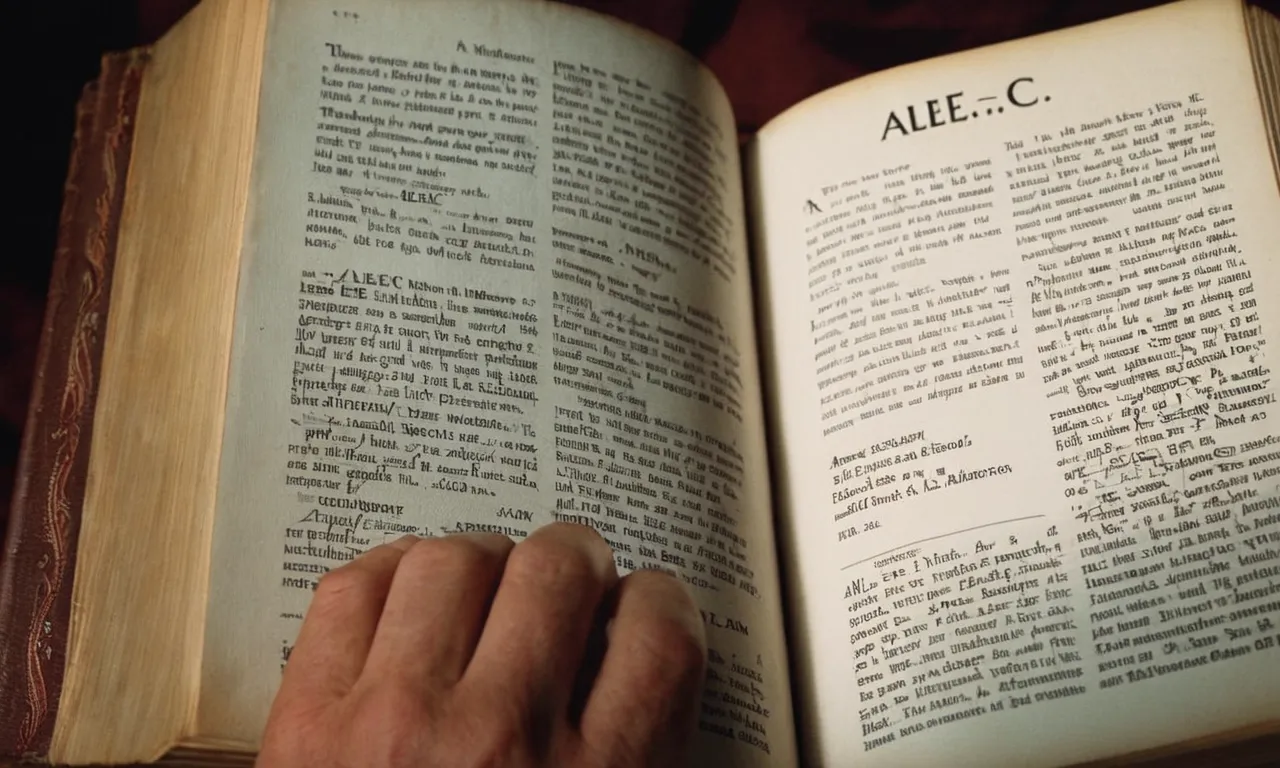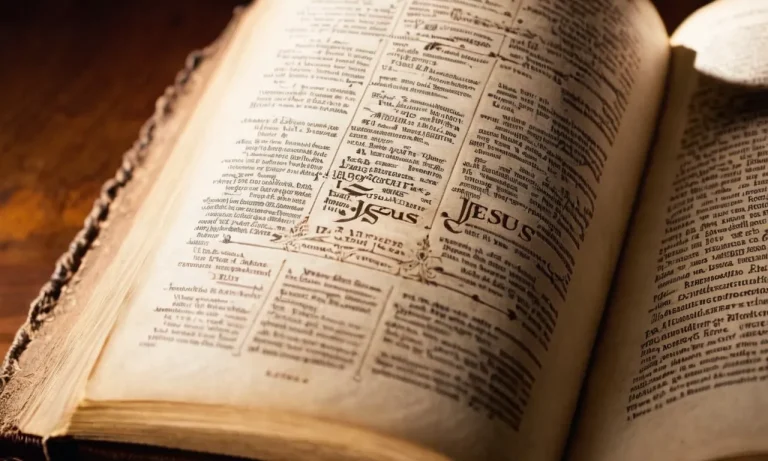What Is The First Day Of The Week In The Bible?
The question of what day constitutes the first day of the week in the Bible is an interesting theological debate. If you’re short on time, here’s a quick answer: According to the Bible, the first day of the week is Sunday.
In this comprehensive article, we will analyze relevant biblical passages to understand the biblical basis for considering Sunday as the first day.
We will examine the creation account, Jesus’s resurrection, early church history, and more to build a thorough case.
The Creation Account Sets the Stage
The Bible begins with the creation account in Genesis, which describes how God created the heavens, the earth, and everything in them in six days.
On the seventh day, God rested from His work of creation. This seventh day would later become the basis for the Sabbath day of rest.
God Rested on the Seventh Day
After spending six days forming the cosmos, the earth, and all living creatures, the Bible says on the seventh day “God finished his work that he had done, and he rested on the seventh day from all his work that he had done.
So God blessed the seventh day and made it holy, because on it God rested from all his work that he had done in creation” (Genesis 2:2-3 ESV).
This establishes the pattern of working for six days and resting on the seventh that would later define the weekly Sabbath day of rest for the Israelites.
God deliberately rested on the seventh day to set it apart as a holy day, distinct from the previous six days of work.
The Seventh Day Became the Sabbath
Later, when God gave the Ten Commandments to the Israelites, He formally made the seventh day the official Sabbath day of rest. Exodus 20:8-11 states:
“Remember the Sabbath day, to keep it holy. Six days you shall labor, and do all your work, but the seventh day is a Sabbath to the Lord your God. On it you shall not do any work…
For in six days the Lord made heaven and earth, the sea, and all that is in them, and rested on the seventh day.
Therefore the Lord blessed the Sabbath day and made it holy.”
Here God ties the Sabbath directly back to His own pattern of working for six days and resting on the seventh during the creation week.
The Israelites were to follow this same rhythm of working for six days but resting on the seventh.
The Next Day Would Have Been the First Day
So after God rested on the seventh day, the next day logically would have been the first day of the week.
While the Bible does not explicitly state that God named or numbered the days of the week at creation, the logical deduction is that the day after God’s day of rest would have been considered the first day of the week.
This understanding was reflected in ancient Jewish and early Christian tradition that upheld Sunday as the first day of the week.
For example, all four Gospels state that Jesus rose from the dead on “the first day of the week” (Matthew 28:1; Mark 16:2; Luke 24:1; John 20:1), which Christians have celebrated as Resurrection Sunday. The day before was the Sabbath, which in Jewish reckoning is the last or seventh day of the week.

Jesus’s Resurrection on Sunday
The Empty Tomb on Sunday Morning
According to the Gospels, Jesus’s empty tomb was discovered early Sunday morning by Mary Magdalene and other women followers of Jesus (Matthew 28:1-8; Mark 16:1-8; Luke 24:1-12).
They had gone to Jesus’s tomb to anoint his body with spices, but found the large stone blocking the entrance rolled away and the tomb empty except for the burial linens.
This shocking discovery set into motion a sequence of events on that Sunday that convinced Jesus’s disciples that he had risen from the dead.
Appearances to the Disciples on Sunday
Later that Sunday, the resurrected Jesus appeared to some of his disciples (John 20:19-23). Despite having the empty tomb report from the women, the disciples struggled to believe Jesus had risen. But seeing him in person dispelled their doubts.
That evening Jesus showed his disciples his crucifixion wounds and they rejoiced at seeing their risen teacher. He commissioned them to spread the news of his resurrection.
The Gospels also record other resurrection appearances Jesus made to his disciples on that Sunday (Luke 24:13-32; John 20:24-29). He walked with two disciples on the road to Emmaus, explaining how the Messiah had to die and rise again.
That evening Jesus appeared to all the disciples, even doubting Thomas, convincing them completely he had risen.
Significance of Sunday for Early Christians
Jesus rising on Sunday was highly significant for early Jewish Christians. God rested on the seventh day after Creation, making the Sabbath on Saturday a sacred day of rest.
But Jesus’s resurrection on the first day of the week, Sunday, marked a new beginning.
Christians began meeting and celebrating communion on Sundays, the Lord’s Day, to commemorate Jesus’s resurrection (Acts 20:7; 1 Corinthians 16:2).
The book of Revelation describes Sunday as the Lord’s Day when John received his apocalyptic vision (Revelation 1:10).
This shows that by the late 1st century AD, Christians universally kept Sunday as a day of worship, teaching, and celebration in honor of Jesus’s resurrection from the dead on that first Easter Sunday.
Sunday as the Biblical First Day
The Bible clearly establishes that God created the heavens and the earth in six days and rested on the seventh day. This day of rest was designated as the Sabbath day according to the Genesis creation account.
The Bible also refers to the Sabbath as the last day of the week, indicating that the previous six days are for work. Therefore, Sunday as the first day of the week has clear biblical support.
In the Ten Commandments given to Moses, God commanded His people to “Remember the Sabbath day, to keep it holy” (Exodus 20:8).
As the seventh day, the Sabbath was to be set apart and dedicated to the Lord. This implies that the previous six days were for work and daily living.
While the Sabbath commandment does not explicitly name the days of the week, the pattern of six days of work and one day of rest definitively establishes the seventh day as the last day.
Further evidence for Sunday as the first day is found in each of the four Gospel accounts of Jesus’ resurrection.
Matthew 28:1 states that “after the Sabbath, at dawn on the first day of the week, Mary Magdalene and the other Mary went to look at the tomb.”
Mark 16:2 also puts the resurrection on the first day of the week after the Sabbath. Luke 24:1 likewise confirms this succession of days.
The apostle John further clarifies this in John 20:1, “Early on the first day of the week, while it was still dark, Mary Magdalene went to the tomb and saw that the stone had been removed from the entrance.”
The combined Gospel accounts unambiguously establish Sunday as beginning the count of days after the Sabbath.
Additional New Testament references bolster Sunday as the first day. In Acts 20:7, the early Christians “came together to break bread” and Paul preached to them on the first day of the week. In 1 Corinthians 16:1-2, Paul instructs the Corinthian church regarding the collection for the saints, to be done “on the first day of every week.”
Conclusion
In conclusion, a survey of relevant biblical texts reveals compelling evidence for considering Sunday as the first day of the week.
This includes the sequence of days in creation, the timing of Jesus’s resurrection, early church practices on Sunday, and the significance the first believers attached to the Lord’s day.
While some objections are raised, a holistic reading of Scripture points to Sunday holding a place of primacy—it was indeed the first day that set the rhythm of the biblical week. This historic Christian view has strong scriptural foundations.








